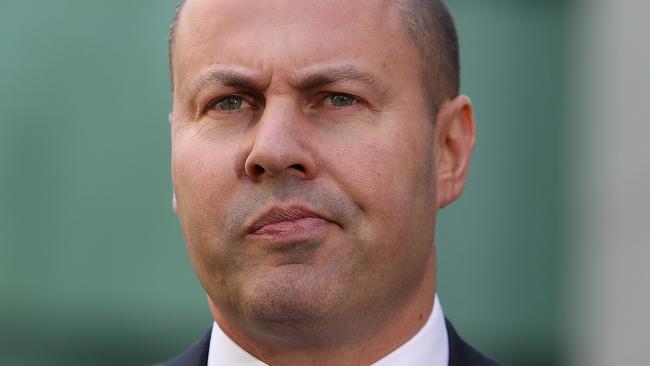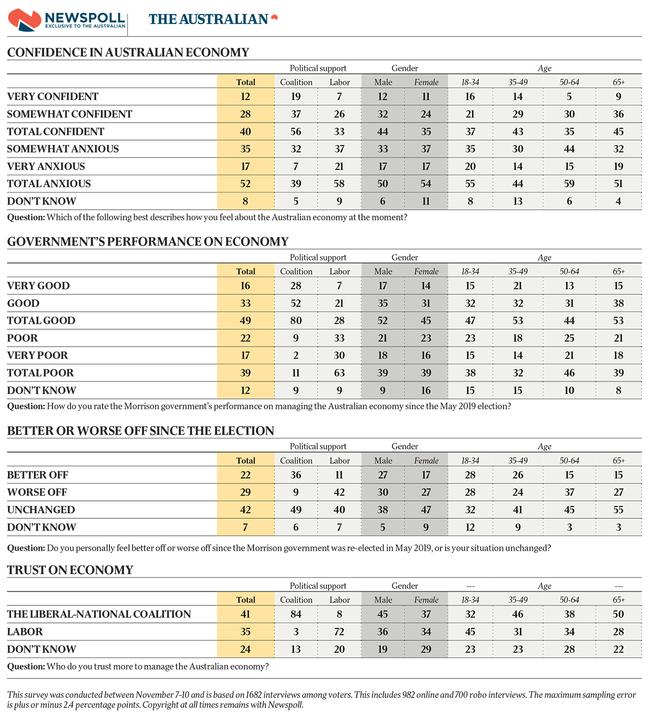Voters anxious but put economic faith in Coalition
A Newspoll shows most voters still place more faith in the Coalition than ALP to run the economy.

A majority of Australians is anxious about the state of the economy but still believes the Coalition is doing a good job managing the books, as Josh Frydenberg warns on Tuesday of the need to combat domestic and global fiscal pressures.
An exclusive Newspoll conducted for The Australian showed that most voters still placed more faith in the Coalition than Labor to run the economy, despite gloomy global and domestic growth forecasts.
However, three official interest rate cuts since June and significant income tax cuts delivered by the government have done little to instil confidence that people felt better off.
READ MORE: PM could be under pressure | Newspoll: ALP draws level as drought hits hard
The poll, the first to test voters’ mood on the broader economy and their own personal circumstances since the May 18 election, showed 52 per cent were now “anxious” about the economy compared with 40 per cent of people who remained confident.
Delivering the second Australia in the World annual lecture at ANU’s Australian Studies Institute on Tuesday, the Treasurer will outline international pressures on the economy.
Mr Frydenberg will pinpoint three key challenges facing the Australian and global economies, including ageing demographics, growing strategic competitiveness and low interest rates and high public debt.
His speech will focus on the need to combat domestic and international pressures on the economy: “In today’s global environment characterised by changing demographics, elevated debt levels, environmental pressures, and great power tensions, it’s critical we pursue reforms at home to retain our competitiveness, openness, and fiscal discipline.”
Newspoll reveals almost half of all voters remained confident in the government’s handling of the conditions, with 49 per cent rating the Morrison government’s performance on managing the economy as good.

However, in signs that voters are seeking a more coherent economic plan from Scott Morrison and Mr Frydenberg, 39 per cent rated their performance as poor. Almost a third of Labor voters believed the government was doing a good job.
Most voters felt their own financial situation had not changed since the election, with 42 per cent claiming nothing had changed. However, 29 per cent believed they were now worse off compared with 22 per cent who claimed to be better off.
While the government has no control of the independent decisions of the Reserve Bank to cut rates, it has delivered up to $1080 in tax refunds already into the hands of 10 million Australians as part of its $158bn income tax cut plan passed by the Senate in July.
Even Coalition voters were skittish about the economy. While 56 per cent said they were confident, 39 per cent were anxious.
The numbers were reversed among Labor voters, with 33 per cent confident and 58 per cent anxious.
The level of concern appeared to be only moderate, with only 17 per cent of all voters claiming to be “very anxious”.
The Coalition kept its dominance over Labor as most trusted to manage the economy, with the Coalition at 41 per cent compared with its rivals on 35 per cent.
Among those who felt better off since the election, Coalition voters rated the highest, with 36 per cent claiming to be better off and 49 per cent unchanged, with 9 per cent feeling they were in a worse situation.
Invoking the Bretton-Woods compact, which established rules for commercial and financial relations among leading Western countries following a 1944 agreement, Mr Frydenberg will say the establishment of the World Trade Organisation, International Monetary Fund and World Bank had worked towards easing “tensions between nations”.
“Australia wants to see the WTO reinvigorated with a more effective dispute-settling mechanism and a broader remit to deal with e-commerce and the opportunities created by the digital economy,” he will say. “So, too, with the IMF — we would like to see change to the governance structures reflecting the greater role played by emerging economies, particularly in Asia.”
Mr Frydenberg will say “Australia’s strong strategic, political and economic ties with key partners both near and abroad” put it in a unique position to remain a global player.
“Trade is vital to empower our region and the globe. It continues to bring millions out of poverty. When other nations grow, so too does Australia.”
Mr Frydenberg will say the shift in the world’s “age structure” will “provide opportunities as the shape of the goods and services we consume change”, but he warns that shrinking workforces will deliver challenges for some nations.
“Asia is home to 60 per cent of the world’s population and it is growing older, with countries like Japan and China at the forefront of the ageing trend.
“According to the UN, today around 22 out of every 100 people in Eastern Asia are aged over 65, broadly in line with the average of 18. By 2050, this will have more than doubled to 55 out of every 100 people, making Eastern Asia much older than the global average of 32.”



To join the conversation, please log in. Don't have an account? Register
Join the conversation, you are commenting as Logout